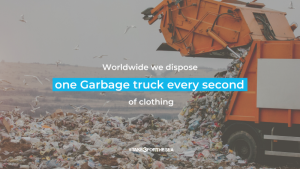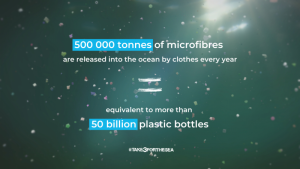Take 3 Weekly News
We all know the problem, right now too many of the plastic products we use end up in the ocean – but did you know one of the biggest contributors to this issue are the clothes we wear?
Polyester, nylon, acrylic, and other synthetic fibers – all of which are forms of plastic – are now about 60 percent of the material that makes up our clothes worldwide due to the rise of ‘fast fashion’.
Synthetic plastic fibers are extremely versatile, providing for stretch and breathability in athleisure, and warmth and sturdiness in winter clothes. Crucially they are also cheap to produce.
The issue is, these synthetic fibres often favoured by ‘fast fashion’ brands are basically a kind of plastic made from petroleum, which means they could take up to a thousand years to biodegrade.
Take 3 CEO Sarah Beard said: “One of the problems with modern day life is not just fast fashion, but fast life. We are so busy that everything is about convenience. Whether that be the single-use plastics that we buy and throw away or cheap clothes, we buy, use, and throw away.
“Everything is about quick and fast turnaround, and we need to think about sustainability and how we can use items over and over and over again rather than continuing to throw trash into the ocean and into the landfills.”

This is a global issue, but Australia is one of the chief offenders, and now send 85% of the textiles we buy to landfill every year. In fact, Australia is the second-largest consumer of new textiles after the US, averaging 27 kilograms of new textiles per annum. We buy it, wear it once or twice, get sick of it – or realise it’s gone out of fashion – and bin it only to begin the cycle all over again.
The environmental impact of ‘fast fashion‘, the phenomenon of buying more and wearing less, is catastrophic. Unfortunately, consumption habits are only growing. Globally, around 56 million tonnes of clothing are bought each year, and this is expected to rise to 93 million tonnes by 2030 and 160 million tonnes by 2050.
As we’ve discussed before, the knock-on effect of more clothes, is increased washing, which releases 500,000 tons of microfibres into the ocean each year, the equivalent of 50 billion plastic bottles.

Inevitably, the plastic particles that make up our fast fashion garments will make their way to our waterways. Many people do look to recycle these items, but the problem is that fast fashion has no intrinsic value in the fibres; it’s not designed to last.
Australian charities are therefore forced to dispose of these items and new figures reveal that is having a devastating impact on their budgets, spending a staggering $13 million per year sending unusable donations to landfill.
Although it is undeniable that the fashion industry is harming our oceans, Take 3 believe in simple action to complex problems. Here’s 3 simple things you can implement into your lifestyle to reduce the impact fast-fashion has on our environment:
- Change your attitude towards fashion: Fast-fashion companies use marketing strategies to make you feel like you need to buy something new and that you should feel ashamed to wear the same thing twice. Ignore these feelings! Take a second look at what you already have.
- Support sustainable: Think about where your item is coming from. Opt for Australian made items with natural fibres. These include; organic cotton, linen, bamboo and hemp. They are much safer for our oceans.
- Reuse, recycle & upcycle: Next time you want to purchase something new, take a look through your wardrobe and see what you can create with what you already have. Why not try swapping with your friends? This can double your wardrobe without spending any money! Don’t buy what everyone else has, why not try and find unique pieces from second-hand stores.
To support Take 3 please donate here or show your support by getting in touch via Instagram or Facebook.




